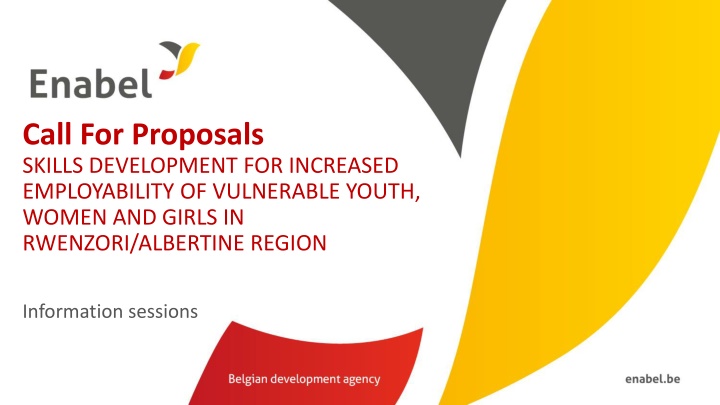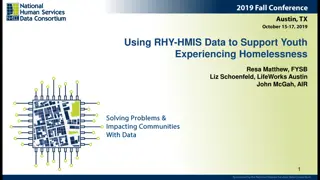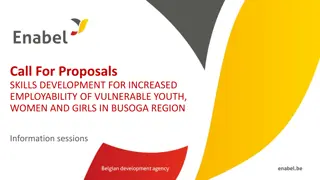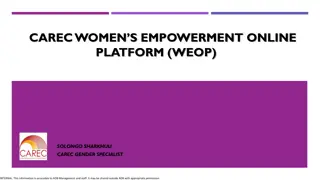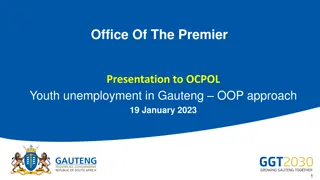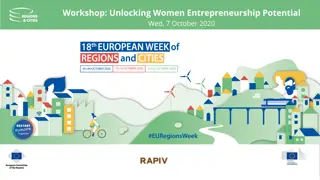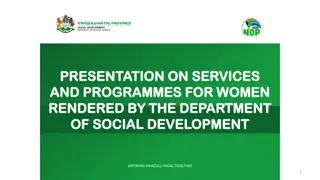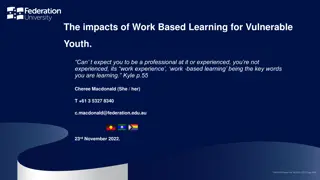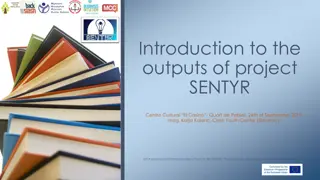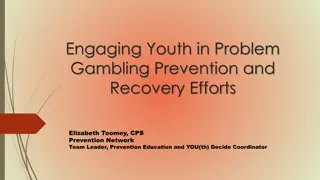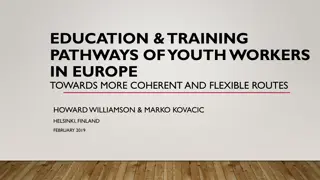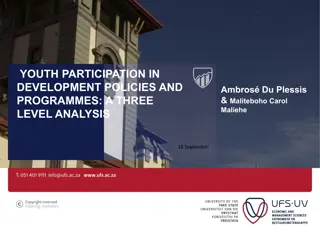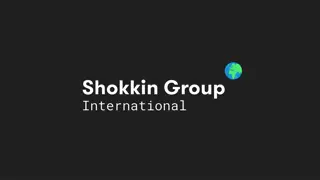Skills Development for Vulnerable Youth and Women in Rwenzori/Albertine Region
Enabel, the Belgian development agency, is launching a call for proposals to enhance the employability of vulnerable youth, women, and girls in the Rwenzori/Albertine region of Uganda. The focus areas include employability, employment, entrepreneurship, education, and health, aiming to create sustainable opportunities for young people and women. Funding from various sources supports interventions to improve skills development, job prospects, and economic independence in the region.
Download Presentation

Please find below an Image/Link to download the presentation.
The content on the website is provided AS IS for your information and personal use only. It may not be sold, licensed, or shared on other websites without obtaining consent from the author.If you encounter any issues during the download, it is possible that the publisher has removed the file from their server.
You are allowed to download the files provided on this website for personal or commercial use, subject to the condition that they are used lawfully. All files are the property of their respective owners.
The content on the website is provided AS IS for your information and personal use only. It may not be sold, licensed, or shared on other websites without obtaining consent from the author.
E N D
Presentation Transcript
Call For Proposals SKILLS DEVELOPMENT FOR INCREASED EMPLOYABILITY OF VULNERABLE YOUTH, WOMEN AND GIRLS IN RWENZORI/ALBERTINE REGION Information sessions
Presentation outline 1. Introduction 2. Objectives of the call 3. Admissibility criteria a. Actors b. Actions c. Costs 4. Vulnerability criteria 5. Concept note application form 6. Application and selection procedure
1. Introduction Enabel, the Belgian development Agency Vision: Young people and women in Uganda develop into active, economically independent citizens in a sustainable society that respects human rights and ensures quality basic services. Focus areas: Employability Employment & Entrepreneurship Education Health Skills development that offers the prospect of decent and green jobs Skilled people find decent and green jobs or start a successful business Quality lower secondary education Training of health personnel & improved capacity of health centres and hospitals
1. Cn't Introduction Interventions are funded by: Belgian government Employability and Employment: Green and decent jobs for youth WeWork Education: WeLearn Health: WeCare and WeTrain4Health and the EU Employability and Employment: Green and decent jobs for youth WeWork Business: SB4U and SBHR Gender: G4DU
1. WeWork: Green and Decent Jobs for Youth Results domain 1 Results domain 2 Results domain 3 Improved employability of young people (especially through skilling and employment services Increased gainful self- employment opportunities through entrepreneurship Increased productivity & sustainability of existing businesses women) Focus on agriculture and the green economy
2. Objectives of the call Guidelines, annexes, clarifications (Q&A) and all other communication: https://www.enabel.be/grants/ Call reference number: UGA22005-10036 Call Title: SKILLS DEVELOPMENT FOR INCREASED EMPLOYABILITY OF VULNERABLE YOUTH, WOMEN AND GIRLS IN RWENZORI/ALBERTINE REGION
2. Call Objectives General objective Improve livelihoods of 2000 vulnerable youth through enhanced access to quality, demand-driven skills development and employment support services Specific objectives The provision of skills development is more equitable, qualitative, innovative, and labour market-driven for increased employment opportunities
2. Call Objectives 2 phased procedure - Concept note stage - Proposal stage
2. SDF basket Quality non-formal skills development Skill gaps identified through livelihood and labour market analysis Meaningful involvement of the (local) private sector in design, implementation and/or assessment of trainings Holistic approach to skills development by integrating career guidance, 21stcentury skills development, work- based learning, social inclusion strategies Intensive and innovative post-training employment support services
2. Call volume and grant amounts Total call volume is 2,000,000 EUR Lot 1: Agriculture: indicative allocation: 1,000,000 EUR Lot 2: Green economy: indicative allocation: 1,000,000 EUR Grant applications must fall between minimum 150,000 and maximum 500,000 Euro Reasonable and efficient unit cost, to take into account holistic approach + intensive post training support
2. Different lots CfP lots 1. Inclusive/accessible 2. Conducive economical and technical conditions 3. Environmental impact Lot 1: Agriculture Small livestock (poultry, piggery) Horticulture Apiary Lot 2: green economy Sustainable tourism Renewable energy (solar) Green construction
3. Admissibility criteria A) The actors: Eligible applicants B) The actions: Admissible actions for grants C) The costs: Acceptable types of costs that may be included in grants
3a. The actors: lead applicant Legal entity Be a public entity or private not for profit or legal entity of private law for which profit maximization is not the priority objective Established or represented in Uganda National or international NGO, Civil Society or Community-Based Organization, Foundation, Business Membership organisation or a non-profit business development service provider with demonstrated experience in managing quality skills development initiatives and economic empowerment of vulnerable youth and women in the selected value chains Demonstrated relevant work experience at least the past 2 years Active Bank Account for the past 12 months In-house financial management capacity
3a. The actors: lead applicant Exclusion grounds: Annex VII grant agreement Applicant s declaration in application form completed and signed (Annex A guidelines) Supporting documents (upon preselection 2ndstage): Criminal record clearances from Interpol NSSF clearance certificate Tax clearance certificate
3a. The actors: the applicant and co- applicant(s) The applicant must mandatorily form a partnership and act with at least one and maximum two co-applicants The partnership between Lead and co-applicants is to optimize cumulation of complementary expertise. The selected applicant becomes the contracting-beneficiary and is the main point of contact for the contracting authority. It shall represent its co-applicant and act in their name. It shall design and coordinate implementation of the action. The co-applicant shall participate in the implementation of the action and the costs that they incur shall be eligible in the same way as those incurred by the lead applicant.
3a. The actors: co-applicants Legal entity Be a public entity or private not for profit or legal entity of private law for which profit maximization is not the priority objective Established or represented in Uganda Be any of the following types of organization: Accredited public or private non-profit technical and/or vocational skills training provider Business Membership Organisation/Association Non-profit Business Development Services (BDS) provider Non-profit private sector business cooperative or enterprise; NGO, Civil Society or Community-Based Organization, Foundation Have 3 years demonstrated work experience in participating in quality skills development and/or employment promotion initiatives in the targeted region. Be registered with relevant authorities and comply with Ugandan legal regulations Have an operational governance structure and an active bank account for the past 12 months
3a. The actors Summary types Organisation type National or international Non-Governmental Organizations (NGOs), Foundations, or Community-Based Organizations (CBOs) Lead applicant Co-applicant Yes Yes Public vocational and/or technical training institutions No Yes Private (not-for-profit) vocational and/or technical training institutions No Yes Non-profit Business Development Services (BDS) provider Yes Yes Business Membership Organizations or associations Yes Yes Non-profit business cooperatives or enterprises No Yes Any application shall involve at least one organization based within the region where the activity will be implemented (acting either as lead or co-applicant).
3a. The actors: Associates Participate actively in the action, but are not eligible for grants and only qualify to receive daily allowances and travelling expenses. To be specified in part B of the application form. They need not to sign the mandate in proposal stage.
3a. The actors: Contractors These are contractors for services, works and equipment. These must be sourced through a procurement process using relevant procedures i.e. PPDA (public procurement law) for public entities and annex VIII of the Grant Agreement for private entities
3b. The actions 1. Duration 2. Location 3. Target beneficiaries 4. Priority sectors and themes 5. Type of action and eligible activities
3b. The actions: Duration - Action/GA : minimum 18 to maximum 24 months - Training programmes: minimum 6 to maximum 9 months, including minimum 30% WBL - Minimum 6 months post-training employment support for successful graduates
3b. The actions: Location The actions must be implemented in Uganda, Rwenzori and Albertine region in at least one of the following districts: Kasese Kabarole Hoima kyegegwa The actions may not be implemented in other districts.
3b. The actions: Target beneficiaries Vulnerable populations residing in the eligible districts Guideline vulnerability criteria Annex H At least 80% youth between the ages of 15 and 35 years At least 50% women and girls
3b. The actions: Priority sectors 1. Agriculture 2. Green economy Non-priority sectors or trades to be substantiated relevance of the proposed trainings to the local labour market and employment opportunities for the specific target group(s) Maximum 5 trades
3b. The actions: Priority sectors agriculture Under the green (climate-smart) agriculture sector, Enabel promotes an economic sector, market-oriented approach that effectively integrates environmental and climate change considerations through the promotion of more sustainable, green and climate- resilient agricultural practices that foster food and nutritional security, (green) job creation and entrepreneurship, as well as livelihood improvement. Social, environmental, economic and technical benefits were used for the selection of priority value chains through which Enabel aims to support the creation of decent (green) jobs.
3b. The actions: Priority sectors agriculture Horticulture Piggery Horticulture farmer/producer Vegetable farmer Fresh vegetable supply chain manager Agro-food processor Greenhouse operator/manager Nursery operator Agro-vet inputs dealer Digital agricultural extension worker Poultry Poultry breeder Poultry farmer/producer Poultry agro-food processor (value addition) Poultry feed producer/mixer Agro-vet inputs dealer- poultry Digital agricultural extension worker. Poultry equipment producer Pig farmer Agro-food processor (Pork value addition) Agro-vet inputs dealer Digital agricultural extension worker. Pig feeds producer/mixer Apiary Honey producer Honey processor Bee keeper/farmer Digital agricultural extension worker Apiary extension service provider Apiary equipment producer Value addition for apiary products (beewax & honey)
3b. The actions: Priority sectors green economy Renewable Energy (Solar) Solar technician / Installer Solar sales agent / Entrepreneur Solar education and awareness coordinator Solar product assembly technician Solar maintenance technician Solar entrepreneur Solar water system & pump technician Solar energy community outreach worker
3b. The actions: Priority sectors green economy Green Construction Skills development and employment promotion actions in green construction are to integrate green building and resource efficiency skills and promote the use of green construction materials (e.g. bamboo, eco-bricks, recycled materials). Applicants can include traditional occupations (i.e. welder, plumber, electrician, bricklayer) that are equally relevant for the green transition in construction, as long they clearly demonstrate that the trainings meet the high quality/standards demanded in the green construction sector and access to employment. ISSB block maker/builder Green construction mason Machine operator (greening systems) Carpenter (with focus on integration of sustainable materials, e.g. bamboo) Sustainable timber producer (i.e. eco-certified timber) Sustainable timber processor Bamboo producer Bamboo processor Bamboo craftsman/artisan Bamboopole treatment assistant
3b. The actions: Priority sectors green economy Sustainable tourism The sustainable tourism and hospitality value chain takes full account of its current and future economic, social and environmental impacts, addressing the needs of visitors, the industry, the environment and host communities. In this regard, the Call promotes actions that address skill gaps and promote employment opportunities for youth in leisure and business tourism, while contributing to the conservation and restoration of the natural environment and cultural heritage, and inclusion of the local community. The Call for Proposals focuses on occupations within the following segments of the tourism value chain: (1) Sustainable attractions and tourist activities: sustainable nature-based experiences, ie. wildlife/natural parks, sustainable agri-tourism and adventure and recreative tourism (hiking, (trail)running, cycling, rafting, kayak, canoeing, trekking or climbing, bird watching), and community-based cultural tourism (culture and heritage experiences, sustainable crafts). (2) Sustainable accommodation: eco-friendly hotels, lodges, guesthouses, hostels, cottages, tented camps and camp grounds, community-based accommodation establishments (bandas), homestays. (3) Food and beverages: organic and locally sourced food production, processing or preparation for visitors and tourism facilities by youth community groups, restaurants, pubs, bakeries, catering services, and on-farm (agri- tourism).
3b. The actions: Priority sectors green economy Sustainabletourism Tour guides (with attention for specialization as per the focus of experience); Tourism activity/attraction managers; Track/trail designers and maintainers; Bicycle mechanics; Safety kayakers; Potters (mountaineering); Occupations relating to sale or rental of adventure or recreative tourism gears/equipment; Occupations relating to sustainable crafts making Hotel managers; Front desk operators; Housekeeping management and operational staff (housekeepers, florists, laundry and room attendants); Cooks, chefs, bakers; Store keepers; Tea and coffee brewers; Caterers, catering managers, conference or banqueting managers or attendants; Farm housekeepers; Waiters and waitresses, bar tenders, baristas; Maintenance and security service providers; Spa and health club managers, attendants and service providers.
3b. The actions: Priority Themes To integrate: Environmental conservation or skills for the green economy Gender roles and reproductive health awareness Entrepreneurial skills Digital literacy or skills for the digital economy Financial literacy Other soft skills for enhanced employability: Work- readiness, conflict management, behavior/attitude skills, etc
3b. The actions: mandatory activities Labour market analysis in order to identify and engage with private sector entities and establish job profiles defining the skills required for potential job opportunities Outreach and awareness or sensitization strategies Social inclusion strategies Non-formal, short-term skills training programmes in the targeted sectors with a duration of minimum 6 to maximum 9 months Assessment and certification, adhering to national standards for non- formal training (Directorate of Industrial Training) Integration of Occupational Health and Safety standards and measures (including materials + protective wear) Integration of soft skills training and entrepreneurship skills training
3b. The actions: mandatory activities Involvement of private sector in design, implementation and/or assessment of trainings and minimum 30% of the training duration allocated to Work-Based Learning Engagement of private sector role models and expertise in mentoring and training Capacity enhancement of co-applicant(s) based on an Organisational Capacity Assessment Provision of start-up kits, tailored to specific business needs or business plans developed by successful graduates and/or groups opting for self- employment 6 months extensive and innovative post-training employment support services
3b. The actions: Other admissible actions Training, studies, workshops, etc Training materials Promotion of social or gender inclusion (e.g., transport arrangements, facilities and procedures that constitute safe learning and work environments, day-care services, counselling or psychosocial support, ) Capacity building local partners (Pre-training) career guidance, coaching Toolkits for WBL Job fairs, networking or matchmaking activities
3b. Number of applications The applicant may not submit more than one (1) application per lot under this Call for Proposals. The applicant may not be awarded more than one (1) Grant Agreement per lot under this Call for Proposals. The applicant may not be at the same time a co-applicant in another application A co-applicant may not be awarded more than one (1) Grant Agreement under this Call for Proposals
Questions? sdf.grants@enabel.be
3c. Admissible/Ineligible costs ii) Management Costs: Direct costs Administration costs directly attributed to the implementation of the actions. This comprise the costs of management, monitoring, equipment, facilities and other costs directly related to the core activity. Examples: IT/Computer equipment(Laptops, printers, projectors, Camera etc.) Furniture and fittings Audit & Accounting fees Salary of program staff+ other direct staff Etc. i) Operational Costs Activity costs necessary for achieving the results of the action. This comprises the costs of the core activities to be implemented. Examples: Training materials Food for trainees Transport costs for trainees or attend training workshop Training fees Etc.
3c. Admissible/Ineligible costs Indirect Costs: Structure Costs (max 7% of operational costs)-to be verified. Administration costs not directly attributed to the project, but are necessary for the implementation of the actions Examples: Office rental Utilities: electricity, water, etc. for project office Salary of the Executive Director or + other support staff Office telecommunication cost Etc.
3c. Admissible/Ineligible costs Reserve for contingencies The budget may include a contingency reserve up to a maximum of 5% of the estimated eligible direct costs. It may only be used with the prior written authorisation of Enabel.
3c. Ineligible costs Subcontracting by means of service or consultancy contracts to personnel members, Board members or General Assembly members of the organisation subsidized Any sub-letting to oneself Purchases of land or buildings; Compensation for damage falling under the civil liability of the organisation Employment termination compensation for the term of notice not performed Purchase of alcoholic beverages, tobacco and derived products thereof Grants to sub-beneficiaries Accounting entries not leading to payments Provisions for liabilities and charges, losses, debts or possible future debts Debts and debit interests Doubtful debts Currency exchange losses Loans to third parties Guarantees and securities; Costs already financed by another grant Invoices made out by other organisations for goods and services already subsidized
3c. Budget template review ANNEX B_Budget template.xls Budget (in EUR) S/NO Category of expenses Activity 1 Operational costs 2 Management costs Structure costs (maximum 7% of operational costs) Total 3
Contn Be innovative and realistic ! Go for it! M&E
Annex H: guideline for vulnerability selection criteria Level of vulnerability a) Low vulnerability 0-15 b) Moderate 15-20 c) High / Critical 20-30 The call prioritises targeting moderate and high levels of vulnerability (individuals scoring above 15 out of 30). However, in applications, alternative criteria can be proposed based on specific regions and contexts.
Vulnerability domains/indicators Youth (15-35 years) Female Refugee School drop out/unskilled/unemployed Orphans with no support Orphans heading households with no support Disadvantaged children Youth with disabilities Child/Female headed households with no support
Vulnerability domains/indicators Child mother/early teenage pregnancy Chronic illness like HIV/AIDS Unaccompanied children / Youth/Separated child Gender based violence victims Bad living conditions No assets
5. Concept note application Use the complete Annex A Grant Application File, Part A. Do not use own templates & do not tweak the template Submission in English only In the concept note, provide only an estimate of the amount requested. Detailed budget (annex B) is only required in second stage (Amount requested in the proposal may not vary more than 20% in relation to the initial estimate) Errors or major inconsistencies concerning the points mentioned in the instructions of the form may result in rejection (e.g., content required, pages, ) Enabel reserves the right to request clarification where the information provided does not enable it to carry out an objective evaluation Elements defined in the concept note may not be modified by the applicant in the proposal
5. Concept note application Complete application = including complete Annex A part A plus applicant s signed declaration and required annexes 1. The concept note declaration signed by the lead applicant The mandate signed by the co-applicant (required in second stage only) 2. Statutes or articles of association of the lead applicant and any co-applicant(s). 3. Permit to operate in the targeted refugee settlement(s) - where applicable
